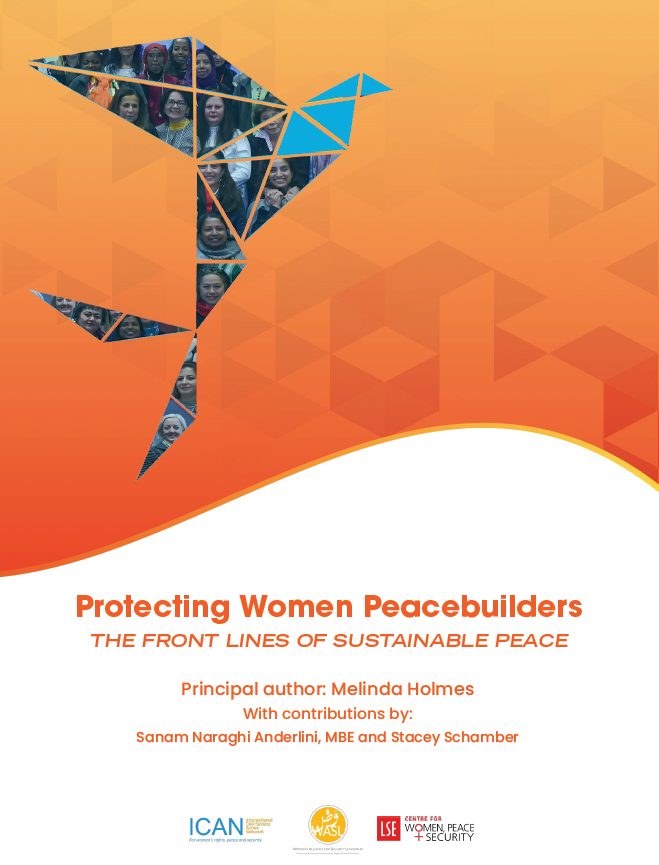
Women peacebuilders use dialogue and engage with different parties to bring actors to the peace table, negotiate humanitarian access, challenge extremist ideologies and violence, and facilitate reconciliation and social healing. However, this engagement with “the other” specifically puts them at risk. Ironically, women who are peacebuilders are threatened because of their peace work.
Women peacebuilders face a complex matrix of risk and targeted threats to their physical, emotional, political, economic, and spiritual health and safety. Threats to women peacebuilders are highly gendered in nature, using their identity, roles, and social norms, against them. They target family members and seek to tarnish women peacebuilders’ reputations often through sexualized attacks. These threats take place off and increasingly online, where the public venue and anonymity amplify their reach and impact.
Despite 20 years of policy, practice, and evidence of impact, there is still a persistent gap in recognition of, support to, and protection for women peacebuilders. This brief distills and builds on decades of women peacebuilders’ experiences navigating these dangers to provide an overview of the contextual factors and realities that create and exacerbate their insecurity. It then presents the range and sources of threats, analyzes the strengths of and gaps in existing protection mechanisms, and concludes with operational guidance for states and multilateral institutions to protect women peacebuilders.
The brief and operational guidance inform the Women Peacebuilders Protection Framework produced by the International Civil Society Action Network (ICAN) with members of the Women’s Alliance for Security Leadership (WASL) and the support of the UK Foreign, Commonwealth & Development Office (FCDO). This initiative is part of the ICAN and WASL She Builds Peace campaign and call to action to stand with women peacebuilders.
Pledge to Protect Women Peacebuilders
The “Operational Guidance to Establish and Enhance the Protection of Women Peacebuilders” suggests actions to take to protect women peacebuilders.
Join us and stand with women peacebuilders.
Operational Guidance to Establish and Enhance the Protection of Women Peacebuilders
Building a Legal and Political Safety Net for Women Peacebuilders
| What to Do | How To Do It |
|
|
|
|
|
|
|
|
|
|
|
|
What Not To Do
- Do not threaten women peacebuilders, their families, their colleagues, or their work.
- Do not isolate women peacebuilders by excluding them from key political and policy arenas.
- Do not ignore women peacebuilders’ perspectives in conflict analysis and security assessments.
- Do not assume that existing protection mechanisms are sufficient to meet women peacebuilders’ needs or that women peacebuilders identify as WHRDs.
- Do not adopt WPS policies and plans without having made a gender and risk analysis aiming to enhance the safety and security of women peacebuilders.
- Do not adopt WPS policies and plans without accompanying and enforceable legislation, monitoring and accountability mechanisms and dedicated resources.
- Do not criminalize women peacebuilders or constrain their work through unwarranted legal and administrative proceedings.
- Do not instrumentalize women peacebuilders and securitize their work by using them as an intelligence source in support of interventions unaligned with a human security approach.
Prevention, Mitigation and Response to Threats to Women Peacebuilders on the Ground
| What to Do | How To Do It |
|
|
|
|
|
|
|
|
|
|
What Not To Do
- Do not ignore, neglect, or generate any threats or reports concerning the safety of women peacebuilders, their families, and/or their organizations.
- Do not assume that there are no security incidents if mechanisms to identify and report them do not exist.
- Do not ignore or respond to incidents on an ad hoc basis; do not delay investigations; and do not withhold information on incidents from women peacebuilders and the public.
- Do not engage media or other stakeholders without first consulting with women peacebuilders.
- Do not assume women peacebuilders have the capacity and resources to implement protection protocols.
- Do not overlook the protection needs of women peacebuilders because they do not fit into the categories of actors as defined by existing frameworks.
Security for Women Peacebuilders at the Peace Table and in International Spaces
| What to Do | How To Do It |
|
|
|
|
|
|
|
|
|
|
What Not To Do
- Do not invite women peacebuilders into international spaces without providing them with the full details about the participants, agenda, and security protocols.
- Do not make assumptions about the risks women peacebuilders face and do not neglect their protection concerns, or those of their family members or organizations.
- Do not share their personal contact information without their permission, as this jeopardizes their safety both while abroad and when they return home.
- Do not expect or burden women peacebuilders to raise funds and do not assume that they will access visas.
- Do not leave women peacebuilders without a follow-up plan.
When Emergency Assistance and Relocation of Women Peacebuilders is Necessary
| What to Do | How To Do It |
|
|
|
|
|
|
What Not To Do
- Do not ignore security incidents or make assumptions about the source of threats against women peacebuilders.
- Do not publicize security concerns or consult others without express consent.
- Do not offer women peacebuilders security arrangements that force a choice between their work, their families, and their safety due to restrictive visa or other provisions.
- Do not rely on existing emergency response mechanisms, which do not sufficiently meet the needs of women peacebuilders.
- Do not penalize women peacebuilders for being forced into exile by delegitimizing them and their work because it is conducted from abroad.
“Peacebuilding work is risky and precarious. In highly polarized contexts where adversaries dehumanize each other, anyone willing to reach across the lines of conflict to engage in dialogue exposes themselves to mistrust from all sides, including from within their own communities.”
-Sanam Naraghi Anderlini, MBE

